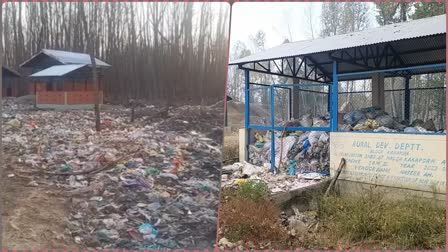Srinagar:The Jammu and Kashmir Union territory has shown significant progress under the Swachh Bharat Mission-Gramin (SBM-G) for ensuring cleaner rural localities and even declared the UT open defecation-free on August 15, 2023, a year before the deadline ended. However, locals and activists say that the SBM's success was “shown only on paper,” as the “on-ground situation remained unchanged.”
Aim Of The Mission
The Swachh Bharat Mission (SBM) was launched on Gandhi Jayanti in October 2014 with much fanfare to ensure a clean India by ending open defecation and managing solid and liquid waste under the sustainable development goals of the United Nations (UN). In rural areas, the scheme is being implemented by the Rural Development Department (RDD) and the Rural Sanitation Department (RSD).
In phase I launched between 2014 and 2019, the target of the mission was to construct toilets to end open defecation, and the RDD constructed 15 lakh plus toilets by the end of October 2, 2018.
The aim of the second phase, between 2019 and 2025, was to ensure visual cleanliness by achieving disposal of greywater and solid waste management across the UT, which was achieved a year before the deadline on August 15.
Lack Of Funds And Infrastructure
The funds for the mission were allocated by the government of India from the 14th Finance Commission and by convergence of MGNREGA scheme funds for the procurement of vehicles and machinery for solid waste management.
Last year the allocated budget for SBM was 494.20 crore, while this year only Rs 325 crore has been kept for the scheme.
The Jammu and Kashmir Pollution Control Committee (JKPCC) said that the Union Territory recycles 52.82% (77.2 MT) of the 146.14 metric tonnes of total plastic waste it generated in the years 2023-24. The UT has 32 operational Plastic Waste Management Units (PMUs), the same number as given by the RDD in its official data, it said. However, the JKPCC data about the waste generation is of municipalities and towns of the 20 districts. Neither the RDD nor the JKPCC have given any data about the waste generated in the 6,650 villages of rural Jammu and Kashmir.
According to the officials of the RDD and RSD rural sanitation, 113 Plastic Waste Management Units (PMU) were built in Jammu and Kashmir, out of which 32 are shown functional.
On paper, the RDD shows that it has procured 1,453 vehicles, including tricycles (637), e-rickshaws (458), and motorised vehicles (358), for transportation of solid waste and has constructed 2,800 segregation sheds in the UT. As per contractors, each segregation shed was built for Rs 7 lakh, while each vehicle was procured at Rs 11 lakh.
A Testimony On The Ground
A case in point is the Kakapora Block in Pulwama district, where the RDD built a Plastic Waste Management Unit (PMU) where waste collected from the whole area was scientifically recycled into fertiliser and reusable plastic. However, the unit has been dysfunctional for the last four months due to objections by the locals and its incomplete construction.
Ali Muhammad Jan, chairman of the sanitation committee, Kakapora, said the unit has been closed for the last three months due to a lack of sufficient machinery, money, and support from the Rural Development employees.
"The machinery in the unit has the capacity of recycling only 5 quintals of solid waste, while the waste generated in Kakapora village is only 10 quintals daily from the 500 households and the shopkeepers. It does not have 24-hour electricity, which makes it dysfunctional given the erratic and unscheduled electricity supply in Kashmir," Jan told ETV Bharat.
He said that deficiency of money for paying wages to the labourers engaged at the unit is also a factor in shutting down the unit, as the sanitation fees collected from the area do not suffice for the wages of the labourers and the driver of the garbage collection vehicle. He said the driver of the vehicle is not paid his wage, and the department owes him Rs 40,000.
